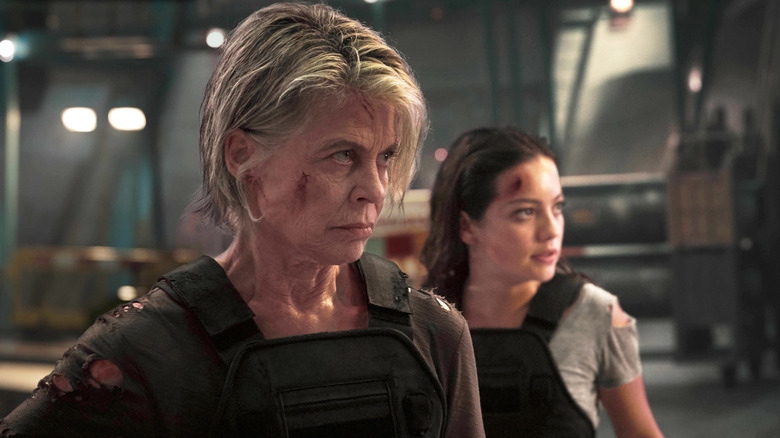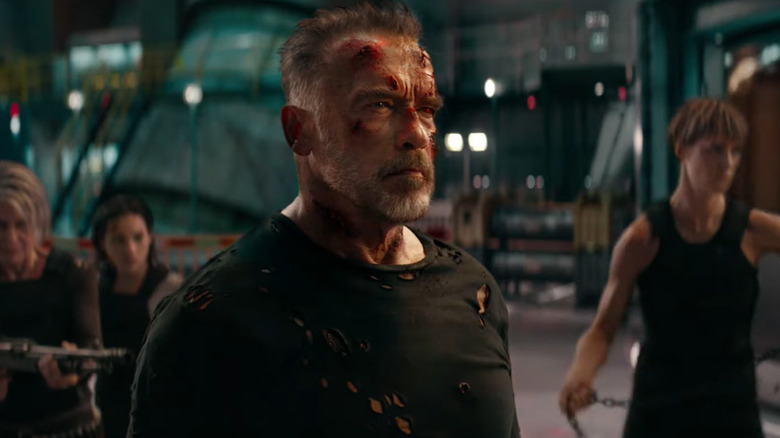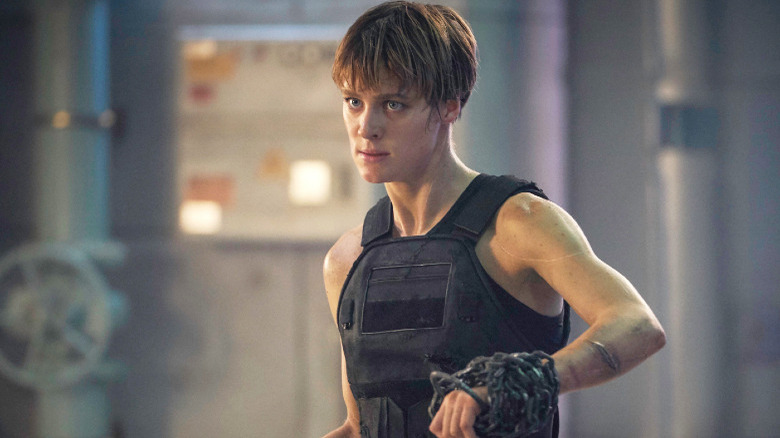Why James Cameron Came Back To The Terminator Franchise
"Terminator 2: Judgement Day" ends with a shot of a highway at night, a potent metaphor for humanity's uncertain future. James Cameron's 1991 sequel was also the perfect stopping point for the franchise, bringing the story and themes from the director's first "Terminator" movie full-circle. But much like the titular robot assassin, the property has proven very hard to kill.
Although he designed the movie to be sequel-proof, Cameron began to reconsider his position after "Judgement Day" hit theaters. By 1995, he told Variety he was "ready to direct" a third "Terminator" film under his new deal with 20th Century Fox, just as soon as he finished a project he was working on about the Titanic. Fox Filmed Entertainment chairman and CEO Bill Mechanic said the studio was more than happy to wait until Cameron was free to helm "Terminator 3," stating it "just doesn't make sense" to make a "Terminator" sequel without him. He was perhaps more right than he knew.
Fox would go on to make three "Terminator" sequels without Cameron, with only 2015's "Terminator Genisys" receiving the director's endorsement. Each time around, the story was the same: A "Terminator" sequel was announced as the first entry in a new trilogy, only for those plans to be scuppered after the film under-performed critically and financially. Finally, 2019's "Terminator: Dark Fate" saw Cameron return as a co-writer and producer, with Tim Miller ("Deadpool") directing.
So what finally drew Cameron back to the "Terminator" franchise? Cheery things like his concerns about the future of the human species, as the filmmaker informed Vanity Fair in 2017.
'It's like we're really on the cusp of an Orwellian Armageddon'
"Terminator: Dark Fate" acts as a direct sequel to "Terminator 2" and largely takes place in 2020, wisely relegating the events of the other "Terminator" sequels to an alternate timeline. Linda Hamilton, the heart of the franchise's first two films, reprises her role in the movie as Sarah Connor, now tasked with protecting Dani Ramos (Natalia Reyes), a young Mexican woman who's been targeted by machine forces from the future.
Where the "Terminator" franchise was born out of Cold War era fears of nuclear annihilation in the 1980s, "Dark Fate" updates the property for the age of surveillance, drone warfare, and increased anti-immigrant sentiments. "I just feel like the world we live in now is going to be very much defined by our co-evolution with our technology," James Cameron told Vanity Fair. He added:
"While technology and innovation have this vast promise for our survival, it's also an enormous threat, especially when it comes to strong [artificial intelligence] being coupled with weaponized robotics, and that's all coming. It's just a question of who gets there first, it's gonna be the next big arms race, it's gonna be like the next race to get the bomb."
Concerns about privacy are similarly at the forefront of "Dark Fate," with modern tech like smartphones making it easier than ever for Terminators from the future to track Sarah's every movement in the film. "... It's like we're really on the cusp of an Orwellian armageddon of inconceivable proportions. Therefore, I thought, hey, let's make a movie about that," Cameron added, cheekily referring to the sequel as "a very cheerful and upbeat kind of film."
The future is not set
Despite James Cameron's involvement, "Terminator: Dark Fate" bombed at the box office, grossing $261.1 million on a $185 million budget. It's a shame it did, too. More than any other "Terminator" project produced since "Terminator 2," Tim Miller's movie takes the franchise into fascinating new thematic territory. It also reflects the growing prominence of transhumanist elements in Cameron's work since "Terminator 2" (see also: "Avatar," "Dark Angel," and "Alita: Battle Angel") by introducing Mackenzie Davis as Grace, a cyborg soldier from the year 2042 who travels back in time to protect Dani.
Even with so much going for it (including, if you will permit me a moment of being shallow, Mackenzie Davis' arms), "Dark Fate" also had to battle franchise fatigue after three "Terminator" sequels that had, at best, mixed success in justifying returning to this specific sci-fi well. Thankfully, however, Cameron and Miller had learned from the property's past mistakes and avoided banking on "Dark Fate" getting a sequel. Instead, its legacy is that of a belated but worthwhile capstone to Cameron's trilogy of "Terminator" movies.
"Terminator: Dark Fate" is available to stream on multiple platforms.


